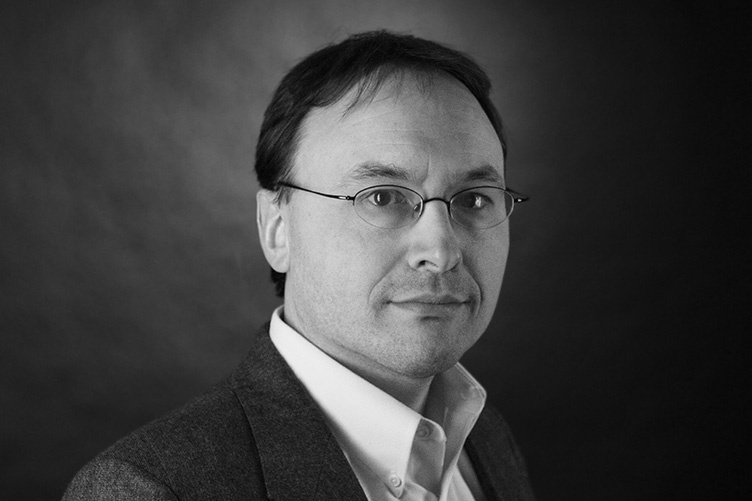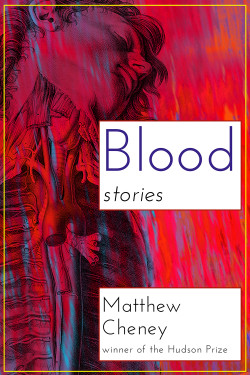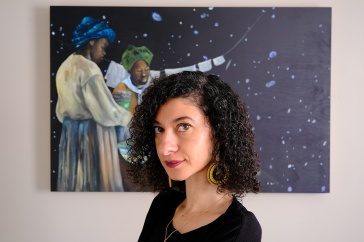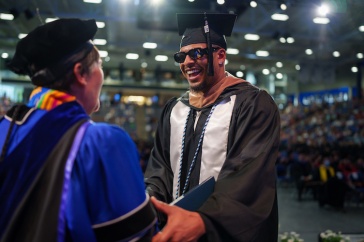
Matthew Cheney. Photo by Amy Wilson.
Matthew Cheney says his decision to pursue a doctorate in literature was triggered by the inheritance of his father’s gun shop in 2007.
Cheney, who was living in New Jersey at the time, returned home to New Hampshire so that he could sell off his father’s guns. The former high school English teacher started teaching courses as an adjunct instructor at Plymouth State College while he tied up his father’s estate. Then, when a full-time English faculty position opened up, Cheney found he was not qualified to apply because he did not have his Ph.D. in literature.
“That was pretty crushing to be honest, but it was also a great spur,” he says. “It made me realize that this was what I wanted to do, and that in fact, I might enjoy the process of getting a Ph.D.”
In 2013, Cheney enrolled in UNH’s Ph.D. program, commuting from Plymouth to Durham, where he taught undergraduate courses and even published a collection of short stories, "Blood: Stories," which won a Hudson Prize for an unpublished collection of poems or short stories from publisher Black Lawrence Press in 2016. His book was featured on New Hampshire Public Radio’s “The Bookshelf.”
This year, Cheney was one of 15 students to receive a UNH Graduate School Dissertation Year Fellowship, an award that recognizes and supports outstanding UNH doctoral students in the final year of their Ph.D. programs.
Thanks to the fellowship, Cheney says he is able to better focus on his research and plans to defend his dissertation by the end of the year.
“This was a great gift and has made a world of difference to me — especially in a field like mine — where there is not a lot of outside money for literature scholarship,” Cheney says.

but writes it. His first book of stories,
"Blood: Stories," was published in 2016
by Black Lawrence Press, which awarded
him the Hudson Prize for an unpublished
collection of poems or short stories.
Cheney’s dissertation explores how three writers — Virginia Woolf, Samuel Delany, and J.M. Coetzee — experiment with combining fiction and nonfiction writing around moments of sociopolitical crisis. He looks at how each negotiates two distinct values: the work of art for art’s sake and the work of art for socio-political purposes. For each writer, a moment of personal and political crisis (the rise of fascism in Europe, the advent of AIDS in New York, and the end of apartheid in South Africa) brought these values into conflict, and each felt some need to meld fiction and nonfiction in a form Woolf called “the essay-novel.”
Cheney credits former professor Jean Kennard (deceased) with sparking his interest in Woolf when he took a seminar class with her more than 20 years ago. His graduate advisor and associate professor of English Robin Hackett inspired him to delve deeper into Woolf’s writings from the 1930s. As for Samuel Delany, Cheney met the science fiction writer while working on his master’s thesis, and even wrote an introduction for a new edition of the author’s book of essays — "The Jewel-Hinged Jaw" — which Cheney first fell in love with at age 12. Cheney says he discovered Coetzee after college and found that the endings of the South African author’s books were always “unsatisfying,” yet they nagged him to continue reading more. The common thread, Cheney suggests, is that all three writers faced worlds of suffering in which they had to make decisions about how to write about the events that shaped their lives.
“The question the three writers wrestle with is one that haunts us all: How might my work speak in a world of crisis?” Cheney says. “As committed as they are to their art, these writers also care about the world beyond their words. My idea…is that they wrote work that caused readers to have to figure out the ‘fictionality’ for themselves — it may say a ‘novel’ or ‘fiction’ on the cover of the book, but then reading it, you encounter the actual author as a character.”
Hackett describes Cheney as an intellectual leader and a “fabulous member of the Department of English,” always willing to share knowledge with other graduate students. As his thesis advisor and a fellow Woolf scholar, she supports his research and lauds his humility, teaching excellence and commitment to the profession.
“His work addresses the crises of humanity and the use of critical thinking in writing,” Hackett says. “He looks at evidence of works of art in which the artists also deal with crisis; and how it impacts their material.”
Cheney began his academic career at New York University’s Tisch School of the Arts, where he originally sought a B.F.A. in dramatic writing, with a goal of becoming a playwright. He completed his bachelor’s degree in English at UNH. Then, he worked as an English and theatre teacher at a boarding school before pursuing a master’s degree in liberal studies at Dartmouth College.
After completing his Ph.D., Cheney says he hopes to pursue a tenure-track position at a university and continue to look at how literary form and content intersect and how writers think about those intersections.
“I am doing this because I had the opportunity and privilege to do so,” he says. “No matter what happens, I will have had years during which I spent most of my time reading and writing; and when I wasn’t reading and writing, I was teaching, which is the only thing I like to do almost as much as reading and writing.”
-
Written By:
Krysten Godfrey Maddocks '96 | College of Liberal Arts | krysten.godfreymaddocks@unh.edu



















































